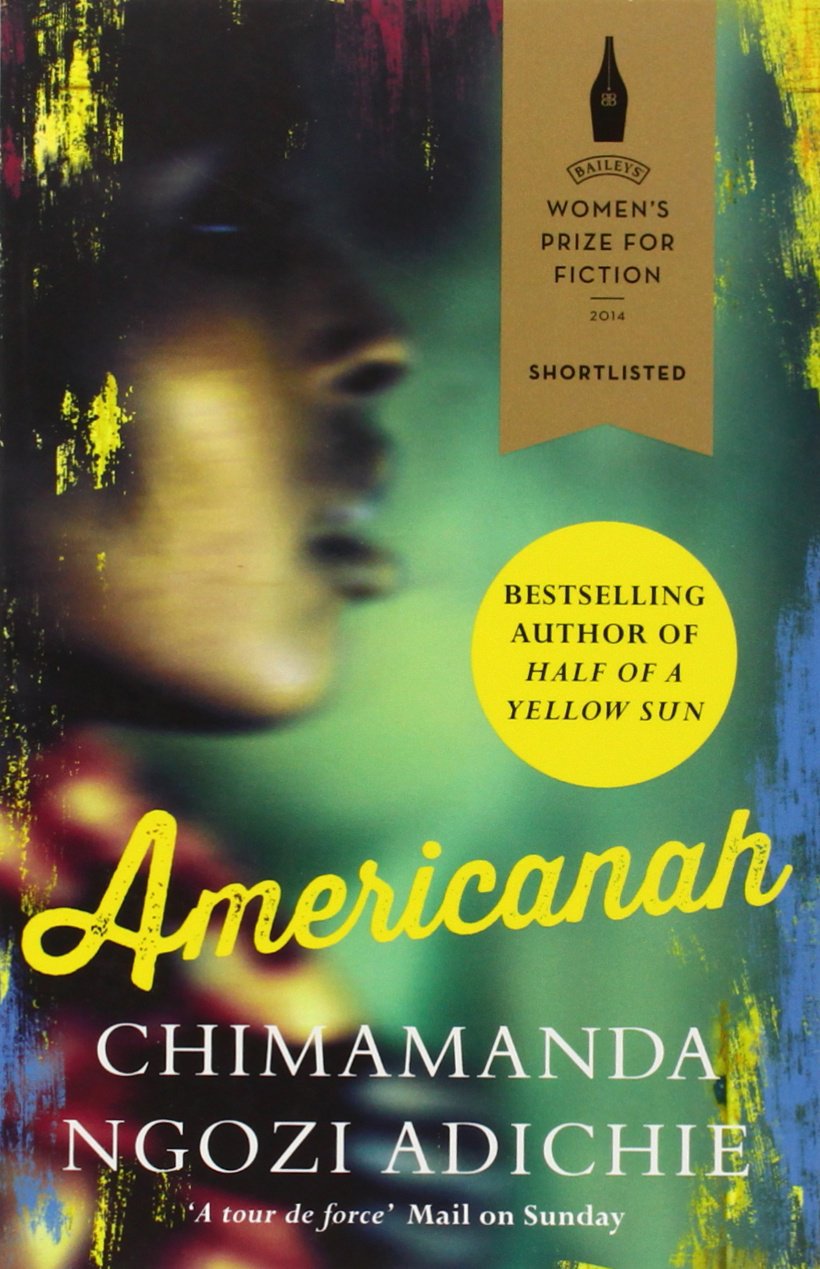E: I've read Adichie's 'Purple Hibiscus,' but her second novel has been on my vague 'to-read' list for far too long. This, her third, being set as May's book put me into action!

Americanah is an engaging and deeply fascinating book. I really wanted her blog to be real - there are some nuances to being black in America then I ever realised. She has written a blog, but it isn't like the blog in the novel. I would also love to know if the same experience would be found living in the UK. I would assume that it's different, but I would like to know how. Am I blind to the racial details that go on in my own country? I didn't know what WASPs, ABs and NABs work. Am I the only one? It is far more complicated than I realised.
For example, it is very important to know how long you have been in Africa if you are a NAB (non-American black). The longer the time, the higher your prestige. You may speak differently with fellow black people, and have a 'White Person is Watching Us voice.' The differences between ABs (American blacks) and NABs is huge. Barely comparable. To most white people, it would not be important; but to black people it defines your identity.
I had the opportunity to listen to parts of 'Americanah' on whisper sync, and I would advocate everyone doing this if possible. It was amazing. Brilliantly read; you can hear the differences between the characters and which country they originated from. The moment I heard Ifemulu's voice, it was as though I was listening to a support worker called Netsai, that I worked with about five years ago. It transported me right back; she was Netsai, she was my total experience of Nigeria, and I can vouch for that within my limited experience.
I was very interested in how much of 'Americanah' was autobiographical, so I went in search of Adichie on the web, and stumbled across a number of her Ted Talks. I would urge anyone to go and listen to them: she is a fantastic speaker, and also fascinating. I particularly enjoyed 'The Danger of a Single Story', as well as the more renowned 'We Should all be Feminists.'
But, I digress. The novel. She has a wonderful turn of phrase, much of the novel is an extended in people watching - which I love. '...like wearing a scratchy sweater in the cold: she longed to yank it off but she was afraid what would happen if she did...' What a brilliant way to describe that horrifically uncomfortable sensation of indecision.
It was very interesting that mental illnesses weren't believed by immigrants; if it is not in the vocabulary, then how can it exist? There is no word for depression, what is self harm? Does something exist unless it is named? This is particularly poignant, thinking of the prevalence of mental illnesses in the first world countries. Another thing that struck a chord was the idea of 'returning to our roots', wanting to recreate the 'good ole' days.' This a luxury only afforded to the privileged: 'Third Worlders are forward looking... in the West their best is already in the past and so they have to make a fetish of that past.'
There were so many interesting factors to this novel; like the fact that Ifemelu actively choosesto give up her acquired American accent. Throwing off something that is supposed to be a real pinnacle to achieve, but she relinquishes it; her return to Nigeria; the attitudes surrounding Obama's inaugural election...
My one criticism is that it could have ended about one hundred pages earlier. This may sound an odd thing to say when I have just expounded the many interesting things it offered me; the extraneous part was the romance. It just felt unnecessary. I suppose a huge number of stories centre on romance; is this why Adichie included it? I feel that she is a more self assured writer to succumb to this. So, it leaves me wondering. There were two novels in this book: Ifemelu's experience with America, and her love interest. Couldn't we just have one?
J: Splendid! The third of Adichie's I've read, and the first to listen to as an audiobook more than reading (using whispersync, which was only partially successful in terms of synching).
What was it about? Lots! Primarily the difficult moral world we all live in, and the many ways we deal with it. Taking place in Nigeria, the US and London from the late eighties to about 2010, and seen mostly through the eyes of Ifemelu, who is a mid teenager when we first meet her, and Obinze, her contemporary and soul-mate (though I don't think that phrase is ever used). It is also very good on the complex subject of race and racism in modern America.
That all sounds rather dry, and I didn't find it so at all. There are lots of lovely characters who I cared about (maybe too many) and I feel as if I learned a lot about places and ways of life I know nothing of through the lives I'm shown.
And although whispersync was a bit graunchy, it was read by a wonderful voice who did all the accents, adding tremendously to my enjoyment.


No comments:
Post a Comment